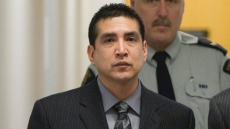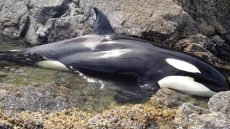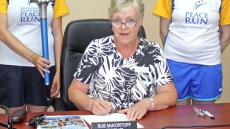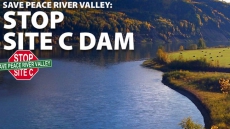MONTREAL — Fears about radioactive contamination may close the door to uranium mining in Quebec just as public angst shelved shale gas extraction in the province in 2011.
"Like shale gas, it touches a sensitive chord in Quebec," says Ugo Lapointe of MiningWatch Canada, which opposes mining of the metal that fuels nuclear power plants.
Hundreds of municipalities have joined First Nations to oppose uranium mining, worried that it could threaten their health, harm natural environments and ruin traditional hunting and fishing.
Quebec's environmental regulation agency (BAPE) has concluded there is no "social acceptability" for uranium mining to proceed at this time. After a year of study, a three-person panel said that it would be premature to authorize development of Quebec's uranium industry.
While uranium mining has made substantial progress, especially in containing waste, there are still many uncertainties and "significant gaps in scientific knowledge of the impacts of uranium mining on the environment and public health," it said in a lengthy report.
The panel said the province could make the current, nearly two-year moratorium permanent, but advised the government to take its time to minimize potential costs, including a large potential payout to Strateco, which is suing the province for $190 million for holding up its mining project in northern Quebec.
A permanent ban would align Quebec with British Columbia and Nova Scotia, coal-producing provinces that have rejected uranium mining.
Quebec Environment Minister David Heurtel has appointed an interdepartmental committee to review the environmental agency's report.
Currently, Saskatchewan is the only uranium-producing province in Canada, and the second-largest producer in the world behind Kazakhstan.
In 2013, its output for three mines was almost 9,000 tons, or about 16 per cent of global production. Quebec's identified uranium reserves are relatively small at about 8,800 tons, the BAPE said.
Industry observers and environmentalists say the regulatory agency's report has given Heurtel cover on the sensitive issue.
"Going against the BAPE ... could be very dangerous politically for him," said Louis Simard, associate professor of political studies at the University of Ottawa.
He said BAPE, which has been around for 35 years, has a lot of credibility with Quebecers.
But the agency's report ignited an angry response from the head of Canada's nuclear safety watchdog, which said its conclusions and recommendations "lack scientific basis and rigour."
To "suggest that uranium mining is unsafe is to imply that the Canadian Nuclear Safety Commission (CNSC) and the government of Saskatchewan have been irresponsible in their approval and oversight of the uranium mines of Canada for the last 30 years," Michael Binder wrote in a letter to the minister.
The nuclear safety commission said there is no link between cancer development and living near or working in a mine or processing facility. It added that environmental monitoring in northern Saskatchewan has shown no risk to health from traditional foods consumed by aboriginal populations.
While nuclear power is seen as a way to reduce greenhouse gases, its global use has fallen to about 12 per cent. The International Atomic Energy Agency expects the share of nuclear power will remain stable through 2035 even though some 67 new plants under construction will nearly double uranium demand to 122,000 tons from around 67,000 tons.
Strateco CEO Guy Hebert, whose Matoush uranium project has been idled, criticized suggestions that not enough information is available on health risks.
Hebert said Canada's former uranium capital of Elliot Lake has become a thriving retirement community, even though 12 uranium mines operated for decades in the northern Ontario community until the 1990s under older, less stringent, regulations.
"If it was a disaster or a deserted, deadly place, nobody would go there," he said in an interview.
The CNSC has said that mining in Elliot Lake did indeed cause "irreparable harm" to several lakes used as mine tailings ponds. But it added that downstream lakes that were negatively affected have gradually recovered with radioactive concentrations in surface water below Canadian guidelines for drinking water and to safely consumer fish.
Valerie Fillion, head of the Quebec Mineral Exploration Association, said the government faces a tough decision because the environmental report has created uncertainty for foreign investors looking at other mining projects in the province.
"Yes it's political, but it's also very economic because if they want us to bring investment to Quebec, some of those investments might not come depending on the decision they make."





